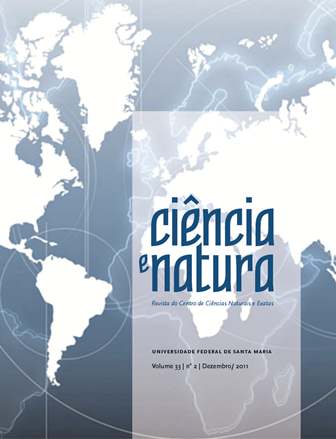Avaliação da Difusividade Térmica de um Solo no Norte do Pantanal
DOI:
https://doi.org/10.5902/2179460X9371Resumo
As propriedades térmicas do solo são resultantes de um conjunto de fatores nos quais se incluem a sua textura e composição química. Observações regulares da temperatura do solo em diferentes profundidades possibilitam identificar o seu comportamento térmico e o conhecimento de importantes propriedades, como difusividade térmica do solo. Sendo assim, o objetivo deste trabalho foi determinar a difusividade térmica do solo de uma pastagem no norte do Pantanal por diferentes métodos. A difusividade térmica do solo foi determinada em uma pastagem de Brachiaria humidicola localizada na Fazenda Experimental da Universidade Federal de Mato Grosso em Santo Antônio de Leverger-MT, com coordenadas geográficas (15º47’11’’S; 56º04’47’’O), de longitude oeste e altitude de 120 m acima do nível do mar. O clima local está na classe Aw segundo Köppen e o solo foi classificado como PLANOSSOLO HÁPICO Eutrófico gleissólico. A temperatura do solo foi realizada a 1, 3, 7, 15, 30, 50 e 57 cm de profundidade por meio de termopares cobre-constantan, conectados a um armazenador de dados. A difusividade térmica do solo foi determinada pelos métodos da amplitude, fase, arco-tangente e logarítmico entre os dias 18 a 28 do mês setembro de 2009. Os valores estimados da difusividade térmica do solo entre as profundidades de 0,01 a 0,03 m foram 0,0244 cm2 s-1 pelo método da amplitude, 0,0723 cm2 s-1 pelo método do logarítmico, 0,0190 cm2 s-1 pelo método da fase e 0,0004 cm2 s-1 no método do arco tangente na profundidade de 0,07 a 0,15 m. Palavras-chave: propriedades térmicas do solo, difusividade térmicaDownloads
Downloads
Publicado
Como Citar
Edição
Seção
Licença
Para acessar a DECLARAÇÃO DE ORIGINALIDADE E EXCLUSIVIDADE E CESSÃO DE DIREITOS AUTORAIS clique aqui.
Diretrizes Éticas para Publicação de Revistas
A revista Ciência e Natura está empenhada em garantir a ética na publicação e na qualidade dos artigos.
A conformidade com padrões de comportamento ético é, portanto, esperada de todas as partes envolvidas: Autores, Editores e Revisores.
Em particular,
Autores: Os Autores devem apresentar uma discussão objetiva sobre a importância do trabalho de pesquisa, bem como detalhes e referências suficientes para permitir que outros reproduzam as experiências. Declarações fraudulentas ou intencionalmente incorretas constituem comportamento antiético e são inaceitáveis. Artigos de Revisão também devem ser objetivos, abrangentes e relatos precisos do estado da arte. Os Autores devem assegurar que seu trabalho é uma obra totalmente original, e se o trabalho e / ou palavras de outros têm sido utilizadas, isso tem sido devidamente reconhecido. O plágio em todas as suas formas constitui um comportamento publicitário não ético e é inaceitável. Submeter o mesmo manuscrito a mais de um jornal simultaneamente constitui um comportamento publicitário não ético e é inaceitável. Os Autores não devem submeter artigos que descrevam essencialmente a mesma pesquisa a mais de uma revista. O Autor correspondente deve garantir que haja um consenso total de todos os Co-autores na aprovação da versão final do artigo e sua submissão para publicação.
Editores: Os Editores devem avaliar manuscritos exclusivamente com base no seu mérito acadêmico. Um Editor não deve usar informações não publicadas na própria pesquisa do Editor sem o consentimento expresso por escrito do Autor. Os Editores devem tomar medidas de resposta razoável quando tiverem sido apresentadas queixas éticas relativas a um manuscrito submetido ou publicado.
Revisores: Todos os manuscritos recebidos para revisão devem ser tratados como documentos confidenciais. As informações ou ideias privilegiadas obtidas através da análise por pares devem ser mantidas confidenciais e não utilizadas para vantagens pessoais. As revisões devem ser conduzidas objetivamente e as observações devem ser formuladas claramente com argumentos de apoio, de modo que os Autores possam usá-los para melhorar o artigo. Qualquer Revisor selecionado que se sinta desqualificado para rever a pesquisa relatada em um manuscrito ou sabe que sua rápida revisão será impossível deve notificar o Editor e desculpar-se do processo de revisão. Os Revisores não devem considerar manuscritos nos quais tenham conflitos de interesse resultantes de relacionamentos ou conexões competitivas, colaborativas ou outras conexões com qualquer dos autores, empresas ou instituições conectadas aos documentos.






